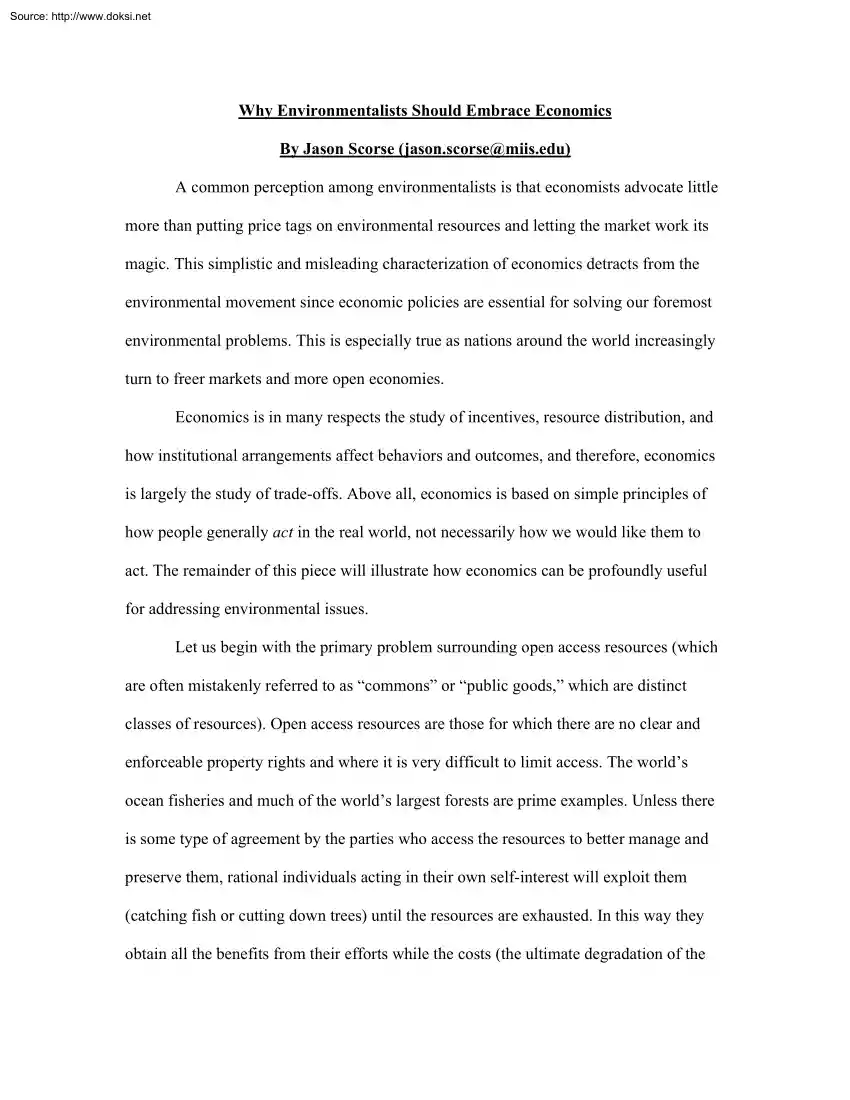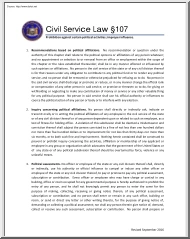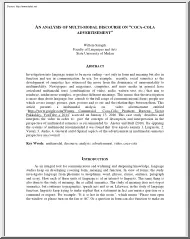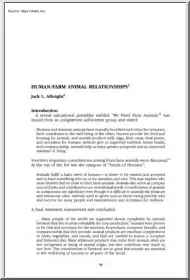A doksi online olvasásához kérlek jelentkezz be!

A doksi online olvasásához kérlek jelentkezz be!
Nincs még értékelés. Legyél Te az első!
Mit olvastak a többiek, ha ezzel végeztek?
Tartalmi kivonat
Source: http://www.doksinet Why Environmentalists Should Embrace Economics By Jason Scorse (jason.scorse@miisedu) A common perception among environmentalists is that economists advocate little more than putting price tags on environmental resources and letting the market work its magic. This simplistic and misleading characterization of economics detracts from the environmental movement since economic policies are essential for solving our foremost environmental problems. This is especially true as nations around the world increasingly turn to freer markets and more open economies. Economics is in many respects the study of incentives, resource distribution, and how institutional arrangements affect behaviors and outcomes, and therefore, economics is largely the study of trade-offs. Above all, economics is based on simple principles of how people generally act in the real world, not necessarily how we would like them to act. The remainder of this piece will illustrate how economics
can be profoundly useful for addressing environmental issues. Let us begin with the primary problem surrounding open access resources (which are often mistakenly referred to as “commons” or “public goods,” which are distinct classes of resources). Open access resources are those for which there are no clear and enforceable property rights and where it is very difficult to limit access. The world’s ocean fisheries and much of the world’s largest forests are prime examples. Unless there is some type of agreement by the parties who access the resources to better manage and preserve them, rational individuals acting in their own self-interest will exploit them (catching fish or cutting down trees) until the resources are exhausted. In this way they obtain all the benefits from their efforts while the costs (the ultimate degradation of the Source: http://www.doksinet resources) are dispersed among the entire population. When large numbers of parties are involved and the
geographic area is large cooperative management is unlikely to occur. This basic logic underlies why 90% of the world’s ocean fisheries have either collapsed or are near collapse, and why the Amazon rainforest continues to be cut down at unprecedented rates. So what are the solutions? There is a role for government intervention in these circumstances to help assign and enforce property rights so that environmental preservation can be achieved. For example, systems of property rights in fisheries can be assigned that limit the fish catch at scientifically-determined levels that will sustain the fish populations, and insure long-term profits for fishermen who are assigned shares to these rights. This has been done with some success in New Zealand, Iceland, Australia, and Canada. Property rights to forest resources can also create incentives for forest owners to better manage their forests since they will be able to reap the rewards from any investments in conservation. Some
environmentalists like to point out that common ownership regimes that predated market-based economies are also legitimate ways to manage environmental resources. While this is true, all of these arrangements involve “in” and “out” groups, and punishment for violation of the rules is often severe (sometimes even death). Many of these more “traditional” regimes also typically break down under population pressures or with the advent of modern technology; therefore, at best, they are imperfect and temporary solutions. The issues surrounding forestry resources are particularly complex, and deserve to be examined in more detail. Although some of the most extreme forms of clear-cutting in the U.S occur in the National Forests (where logging is heavily subsidized and therefore Source: http://www.doksinet the market is not functioning efficiently), clear-cutting also occurs on private lands with clear property rights. Such examples are often used by critics of market economies
to argue that private property offers no solutions to environmental problems. So why is it that an owner of a forest decides to clear-cut trees? The likely answer is that this is what maximizes profits: cutting trees in large swaths and then replanting them with fastgrowing monocultures is what is best for the company’s bottom line. Although the forest has numerous other benefits to society (the provision of fresh air, beauty, recreation, biodiversity, watershed protection, and intrinsic value), timber companies are likely to ignore these when thinking about how to earn the most money. This isn’t evil or immoral, but simply the logic of business that is employed in thousands of occupations every day everywhere in the world. But what about the other values that forests have, which are sometimes greater than the value of the timber? How do we get the market to recognize these values and take them into account? One option is to develop forestry regulations that mandate certain types
of practices; e.g, no logging in riparian zones, limits on the size of clearcuts, no cutting in areas with endangered species, etc Another is to make some estimate of the environmental costs of logging and then apply a tax on timber production so that timber companies internalize these costs in their decisions (which too will result in lower levels of logging). Another option is to focus on the consumer side and create markets for sustainable timber products (the Forest Stewardship Council is doing just this). Yet another is for those who value the environmental benefits of forests to purchase the land from the timber companies. A dramatic example of such a transaction was the City of New York’s decision to purchase the watershed for the city’s drinking supply in Upstate Source: http://www.doksinet New York in 1997 (property rights don’t always have to be privately owned). City officials realized that instead of building a new water purification plant, the city could save
money by protecting the watershed from development because the forest acts as a natural water purifier. The Nature Conservancy is an example of an environmental organization that makes ample use of markets by purchasing land for conservation around the world through the donations of its members. What these solutions have in common is that they are based on clear and enforceable property rights. In the absence of such rights, attempts to promote environmental values will often be hindered because long-term solutions require legally identifiable parties that can both derive benefits from ownership and suffer repercussions for violation of ownership rules. To put it another way, markets and property rights are two sides of the same coin since parties can’t rightfully trade what is not theirs. Does this mean that private property rights solve everything? Of course not, and most economists freely admit that market-based systems are replete with examples of environmental abuse. However,
the worst forms of environmental abuse generally occur in areas where property rights and markets are non-existent, or where the market is distorted by perverse subsidies that encourage over-exploitation. It is no coincidence that the countries with the best environmental regulations and environmental quality are almost exclusively market-based economies with strong systems of property rights. Even with enforceable property rights and a solid system of environmental accounting, markets are not perfect and are subject to unintended consequences. Global warming presents a particularly difficult challenge. The atmosphere is the world’s preeminent open access resource, and exclusion is impossible. This doesn’t Source: http://www.doksinet mean, however, that property rights and markets solutions cannot play a role in mitigating climate change. Some of the solutions currently being discussed for long-term climate management are enforceable limits on greenhouse gas emissions through a
system of tradable atmospheric pollution permits. While some environmentalists oppose pollution permits on the grounds that they establish a “right to pollute,” all industrial activities require some level of greenhouse gas pollution and tradable permits may provide both the cheapest and most equitable way of achieving targeted reductions (big greenhouse polluters like the U.S would likely end up buying credits from less-polluting nations). Since research and development of alternative energy technologies needs to be a big part of any long-term solution, policies aimed at accelerating R&D are paramount. Economists have a long history of studying innovation, and can provide many practical recommendations on how to develop policies to guide future efforts. For example, targeted subsidies or different forms of patents can positively influence the R&D trajectory of the alternative energy sector. One concern that many people express regarding private property is that resources
that typically were free or available at little cost to almost everyone are now being “commodified.” Common examples include water and botanical genetic resources Critics of the private ownership of these resources too often only present only one side of the story, and use hyperbolic rhetoric to obscure the deeper issues. For example, while we can all agree that everyone should have access to clean drinking water the fact is that billions of people, for a variety of reasons, do not. Sometimes the water has been contaminated, the aquifers have been depleted, regions have suffered droughts, or the public agency in charge is corrupt. In addition, water purification and delivery are Source: http://www.doksinet extremely expensive and entail complex systems of infrastructure and maintenance. Privatization of water systems in many instances can bring much needed capital into areas that lack infrastructure and actually improve people’s access to clean water, including the poor. There
are other instances where privatization has led to large rate increases and lower levels of access. The appropriate response is to ask why privatization has worked well in some areas and not in others, not to condemn it across the board. (Consider: food is also necessary for life, but no one is waging a battle against farmers who happen to be in the private business of bringing food to your dinner table.) Regarding botanical genetic resources, there is a worldwide system of international gene banks to which virtually all nations have free access. In addition, patents provide a legal system whereby individuals or corporations can gain exclusive rights to modified organisms. This can bring much needed research money into plant development with the potential of improving nutrition and productivity in poor regions of the world. Granted, there is also an underlying danger that patents can be abused when they are issued for relatively minor modifications to staple crops. Again, a key
question needs to be asked: how do we establish a patent system that is equitable and efficient? One attractive option is for international aid organizations and governments to fund basic research and then allow everyone to freely access the fruits of this work. This would bypass the need for plant patents almost entirely, and would likely result in the most benefit for poorer countries. However, it would also require large donations, since R&D is extremely expensive. The point here is that private ownership of key environmental resources can lead to many positive social and environmental outcomes, as well as bad ones depending on Source: http://www.doksinet the institutional arrangements that surround them. People often forget that privatelyowned does not mean unregulated Often a well-regulated corporation can provide services cheaper and of higher quality to citizens than a state-owned enterprise. And sometimes not; it comes down to the details. On the topic of monetizing
environmental resources, something which many environmentalists take issue with, the point is that simply saying that some of the world’s resources are priceless or not for sale (and therefore, beyond the scope of economics and the market) doesn’t make it so. Priceless to whom? And if they are priceless, who will protect them? And who will pay for this protection? Who is liable if they aren’t protected? These are difficult questions that defy simplistic notions of what is right and wrong, and force us to think more critically about our assumptions of the world and how people behave, including ourselves. There are some resources that most of us can agree are so unique and spectacular that they should be protected forever. Yosemite and the Great Barrier Reef are two that come to mind, and efforts have been undertaken to protect these resources in perpetuity. However, even here we are faced with tough questions as the high demand to view these natural wonders has created strains
that threaten their long-term viability. How do we determine who gets entry or what areas should be offlimits to the public? More generally, when thinking about environmental preservation how do we prioritize areas? Although biological richness is a key indicator of preservation value, what about the opportunity cost for lost development, or the costs of monitoring, or public access? Is every last species equally valuable? What level of contaminants indicates a pristine environment? There is much less consensus with regard to questions like these. Economics has a constructive role to play in trying to answer Source: http://www.doksinet these questions since economics provides a methodology for weighing the potential trade-offs. Economics also offers methodologies to help predict how changes in the status quo will likely affect people’s future behavior. Environmentalists should also recognize that attempts to assign monetary values to the environment are often used in circumstances
where the default value is zero. In many decisions-making processes environmental resources aren’t taken into account at all, and any attempts to value them actually strengthen their position in the decisionmaking equation. This is not to say that monetizing the environment doesn’t have its limitations or that it can’t be abused, only that rejecting it as immoral is poor policy. Think about it: every time one of us gets into a plane to go on vacation somewhere we have decided that the hundreds or thousands of dollars we are spending on leisure is more important than saving another acre of trees or giving money to the poor (alternative uses of our money); so, through our actions, we implicitly put values on all types of supposedly priceless things all the time. This doesn’t make us crass and immoral beings; it is simply a fact that the overwhelming majority of us think first and foremost about our own needs and desires, even if we also have altruistic and selfless tendencies. In
summary, economic reasoning, property rights, and well-functioning markets may not provide all the answers to our environmental problems, but they are not the drivers of environmental degradation as they are so often portrayed. In fact, there are many situations in which economic principles, applied rigorously and thoughtfully, actually offer the best hopes for environmental improvement and preservation, as well as improvement in living standards. If environmentalists spent more time learning about economic policy they would likely become some of its most ardent supporters
can be profoundly useful for addressing environmental issues. Let us begin with the primary problem surrounding open access resources (which are often mistakenly referred to as “commons” or “public goods,” which are distinct classes of resources). Open access resources are those for which there are no clear and enforceable property rights and where it is very difficult to limit access. The world’s ocean fisheries and much of the world’s largest forests are prime examples. Unless there is some type of agreement by the parties who access the resources to better manage and preserve them, rational individuals acting in their own self-interest will exploit them (catching fish or cutting down trees) until the resources are exhausted. In this way they obtain all the benefits from their efforts while the costs (the ultimate degradation of the Source: http://www.doksinet resources) are dispersed among the entire population. When large numbers of parties are involved and the
geographic area is large cooperative management is unlikely to occur. This basic logic underlies why 90% of the world’s ocean fisheries have either collapsed or are near collapse, and why the Amazon rainforest continues to be cut down at unprecedented rates. So what are the solutions? There is a role for government intervention in these circumstances to help assign and enforce property rights so that environmental preservation can be achieved. For example, systems of property rights in fisheries can be assigned that limit the fish catch at scientifically-determined levels that will sustain the fish populations, and insure long-term profits for fishermen who are assigned shares to these rights. This has been done with some success in New Zealand, Iceland, Australia, and Canada. Property rights to forest resources can also create incentives for forest owners to better manage their forests since they will be able to reap the rewards from any investments in conservation. Some
environmentalists like to point out that common ownership regimes that predated market-based economies are also legitimate ways to manage environmental resources. While this is true, all of these arrangements involve “in” and “out” groups, and punishment for violation of the rules is often severe (sometimes even death). Many of these more “traditional” regimes also typically break down under population pressures or with the advent of modern technology; therefore, at best, they are imperfect and temporary solutions. The issues surrounding forestry resources are particularly complex, and deserve to be examined in more detail. Although some of the most extreme forms of clear-cutting in the U.S occur in the National Forests (where logging is heavily subsidized and therefore Source: http://www.doksinet the market is not functioning efficiently), clear-cutting also occurs on private lands with clear property rights. Such examples are often used by critics of market economies
to argue that private property offers no solutions to environmental problems. So why is it that an owner of a forest decides to clear-cut trees? The likely answer is that this is what maximizes profits: cutting trees in large swaths and then replanting them with fastgrowing monocultures is what is best for the company’s bottom line. Although the forest has numerous other benefits to society (the provision of fresh air, beauty, recreation, biodiversity, watershed protection, and intrinsic value), timber companies are likely to ignore these when thinking about how to earn the most money. This isn’t evil or immoral, but simply the logic of business that is employed in thousands of occupations every day everywhere in the world. But what about the other values that forests have, which are sometimes greater than the value of the timber? How do we get the market to recognize these values and take them into account? One option is to develop forestry regulations that mandate certain types
of practices; e.g, no logging in riparian zones, limits on the size of clearcuts, no cutting in areas with endangered species, etc Another is to make some estimate of the environmental costs of logging and then apply a tax on timber production so that timber companies internalize these costs in their decisions (which too will result in lower levels of logging). Another option is to focus on the consumer side and create markets for sustainable timber products (the Forest Stewardship Council is doing just this). Yet another is for those who value the environmental benefits of forests to purchase the land from the timber companies. A dramatic example of such a transaction was the City of New York’s decision to purchase the watershed for the city’s drinking supply in Upstate Source: http://www.doksinet New York in 1997 (property rights don’t always have to be privately owned). City officials realized that instead of building a new water purification plant, the city could save
money by protecting the watershed from development because the forest acts as a natural water purifier. The Nature Conservancy is an example of an environmental organization that makes ample use of markets by purchasing land for conservation around the world through the donations of its members. What these solutions have in common is that they are based on clear and enforceable property rights. In the absence of such rights, attempts to promote environmental values will often be hindered because long-term solutions require legally identifiable parties that can both derive benefits from ownership and suffer repercussions for violation of ownership rules. To put it another way, markets and property rights are two sides of the same coin since parties can’t rightfully trade what is not theirs. Does this mean that private property rights solve everything? Of course not, and most economists freely admit that market-based systems are replete with examples of environmental abuse. However,
the worst forms of environmental abuse generally occur in areas where property rights and markets are non-existent, or where the market is distorted by perverse subsidies that encourage over-exploitation. It is no coincidence that the countries with the best environmental regulations and environmental quality are almost exclusively market-based economies with strong systems of property rights. Even with enforceable property rights and a solid system of environmental accounting, markets are not perfect and are subject to unintended consequences. Global warming presents a particularly difficult challenge. The atmosphere is the world’s preeminent open access resource, and exclusion is impossible. This doesn’t Source: http://www.doksinet mean, however, that property rights and markets solutions cannot play a role in mitigating climate change. Some of the solutions currently being discussed for long-term climate management are enforceable limits on greenhouse gas emissions through a
system of tradable atmospheric pollution permits. While some environmentalists oppose pollution permits on the grounds that they establish a “right to pollute,” all industrial activities require some level of greenhouse gas pollution and tradable permits may provide both the cheapest and most equitable way of achieving targeted reductions (big greenhouse polluters like the U.S would likely end up buying credits from less-polluting nations). Since research and development of alternative energy technologies needs to be a big part of any long-term solution, policies aimed at accelerating R&D are paramount. Economists have a long history of studying innovation, and can provide many practical recommendations on how to develop policies to guide future efforts. For example, targeted subsidies or different forms of patents can positively influence the R&D trajectory of the alternative energy sector. One concern that many people express regarding private property is that resources
that typically were free or available at little cost to almost everyone are now being “commodified.” Common examples include water and botanical genetic resources Critics of the private ownership of these resources too often only present only one side of the story, and use hyperbolic rhetoric to obscure the deeper issues. For example, while we can all agree that everyone should have access to clean drinking water the fact is that billions of people, for a variety of reasons, do not. Sometimes the water has been contaminated, the aquifers have been depleted, regions have suffered droughts, or the public agency in charge is corrupt. In addition, water purification and delivery are Source: http://www.doksinet extremely expensive and entail complex systems of infrastructure and maintenance. Privatization of water systems in many instances can bring much needed capital into areas that lack infrastructure and actually improve people’s access to clean water, including the poor. There
are other instances where privatization has led to large rate increases and lower levels of access. The appropriate response is to ask why privatization has worked well in some areas and not in others, not to condemn it across the board. (Consider: food is also necessary for life, but no one is waging a battle against farmers who happen to be in the private business of bringing food to your dinner table.) Regarding botanical genetic resources, there is a worldwide system of international gene banks to which virtually all nations have free access. In addition, patents provide a legal system whereby individuals or corporations can gain exclusive rights to modified organisms. This can bring much needed research money into plant development with the potential of improving nutrition and productivity in poor regions of the world. Granted, there is also an underlying danger that patents can be abused when they are issued for relatively minor modifications to staple crops. Again, a key
question needs to be asked: how do we establish a patent system that is equitable and efficient? One attractive option is for international aid organizations and governments to fund basic research and then allow everyone to freely access the fruits of this work. This would bypass the need for plant patents almost entirely, and would likely result in the most benefit for poorer countries. However, it would also require large donations, since R&D is extremely expensive. The point here is that private ownership of key environmental resources can lead to many positive social and environmental outcomes, as well as bad ones depending on Source: http://www.doksinet the institutional arrangements that surround them. People often forget that privatelyowned does not mean unregulated Often a well-regulated corporation can provide services cheaper and of higher quality to citizens than a state-owned enterprise. And sometimes not; it comes down to the details. On the topic of monetizing
environmental resources, something which many environmentalists take issue with, the point is that simply saying that some of the world’s resources are priceless or not for sale (and therefore, beyond the scope of economics and the market) doesn’t make it so. Priceless to whom? And if they are priceless, who will protect them? And who will pay for this protection? Who is liable if they aren’t protected? These are difficult questions that defy simplistic notions of what is right and wrong, and force us to think more critically about our assumptions of the world and how people behave, including ourselves. There are some resources that most of us can agree are so unique and spectacular that they should be protected forever. Yosemite and the Great Barrier Reef are two that come to mind, and efforts have been undertaken to protect these resources in perpetuity. However, even here we are faced with tough questions as the high demand to view these natural wonders has created strains
that threaten their long-term viability. How do we determine who gets entry or what areas should be offlimits to the public? More generally, when thinking about environmental preservation how do we prioritize areas? Although biological richness is a key indicator of preservation value, what about the opportunity cost for lost development, or the costs of monitoring, or public access? Is every last species equally valuable? What level of contaminants indicates a pristine environment? There is much less consensus with regard to questions like these. Economics has a constructive role to play in trying to answer Source: http://www.doksinet these questions since economics provides a methodology for weighing the potential trade-offs. Economics also offers methodologies to help predict how changes in the status quo will likely affect people’s future behavior. Environmentalists should also recognize that attempts to assign monetary values to the environment are often used in circumstances
where the default value is zero. In many decisions-making processes environmental resources aren’t taken into account at all, and any attempts to value them actually strengthen their position in the decisionmaking equation. This is not to say that monetizing the environment doesn’t have its limitations or that it can’t be abused, only that rejecting it as immoral is poor policy. Think about it: every time one of us gets into a plane to go on vacation somewhere we have decided that the hundreds or thousands of dollars we are spending on leisure is more important than saving another acre of trees or giving money to the poor (alternative uses of our money); so, through our actions, we implicitly put values on all types of supposedly priceless things all the time. This doesn’t make us crass and immoral beings; it is simply a fact that the overwhelming majority of us think first and foremost about our own needs and desires, even if we also have altruistic and selfless tendencies. In
summary, economic reasoning, property rights, and well-functioning markets may not provide all the answers to our environmental problems, but they are not the drivers of environmental degradation as they are so often portrayed. In fact, there are many situations in which economic principles, applied rigorously and thoughtfully, actually offer the best hopes for environmental improvement and preservation, as well as improvement in living standards. If environmentalists spent more time learning about economic policy they would likely become some of its most ardent supporters



